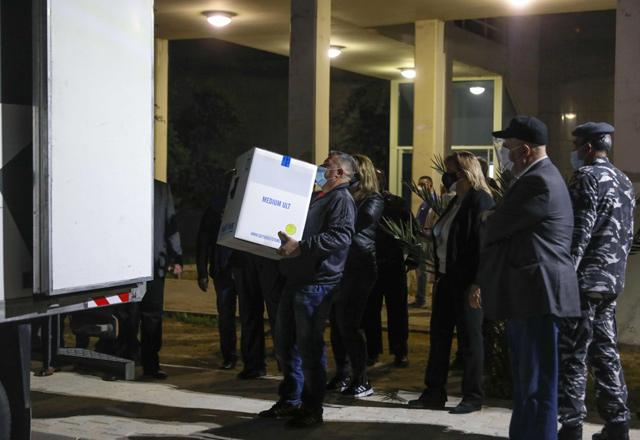- International News
- Sun-2021-02-14 | 05:00 pm

Lebanon on Saturday received its first vaccines against the coronavirus, a day before an inoculation drive kicks off in the crisis-hit Mediterranean country.
A plane landed at the Beirut airport, an AFP correspondent reported, with authorities saying it was carrying 28,500 doses of Pfizer/BioNTech flown in from Belgium.
The shipment was the first after the World Bank allocated $34 million to inoculate 2 million of Lebanon's 6 million inhabitants.
Caretaker Health Minister Hamad Hassan was on the tarmac to welcome the plane and expressed great "relief".
"It's a dream being realised today thanks to the support of our UN and international partners," he told reporters,
"The vaccine will reach all Lebanese citizens across the country," as well as Syrian and Palestinian refugees and other residents, he promised.
Lebanon has been under strict lockdown since mid-January, after an unprecedented spike in cases blamed on holiday gatherings that forced overwhelmed hospitals to turn away patients.
Vaccination rollout is set to start on Sunday.
Health workers will receive their first dose at the Rafik Hariri Hospital, the country’s main public hospital tackling the COVID-19 outbreak, the American University of Beirut Medical Centre, and Saint George Orthodox Hospital.
"The best gift one can ask for on Valentine’s Day,” wrote the director of the Rafik Hariri Hospital, Firas Abiad, on Twitter.
Prime Minister Hassan Diab, 61, is also to be vaccinated, his office said.
Under Lebanon’s vaccination plan, medical staff and those over the age of 75 are to receive the jab first.
In total Lebanon hopes to receive around 6 million vaccine doses, including 2 million from Pfizer/BioNTech and another 2.7 million via the international Covax distribution programme.
Half a million people in Lebanon have signed up to receive a vaccine, a health ministry official said, although many are hesitant to get the jab.
Of 500 people surveyed by private think-tank Information International, 31 per cent said they would get vaccinated, 38 per cent said they would rather not, and another 31 percent were undecided.
Lebanon was already in the throes of its worst economic crisis in decades when COVID-19 hit, and the situation has been exacerbated after a massive blast at Beirut’s port in August killed more than 200 people and destroyed large parts of the capital.
The World Bank and the International Federation of Red Cross and Red Crescent Societies are to monitor the rollout, they said in a statement Friday.
They aim to "ensure fair, broad, and fast access to COVID-19 vaccines to help save lives and support economic recovery”, World Bank regional director Saroj Kumar Jha said.
Lebanon says 334,086 people have caught coronavirus since February 2020, of whom 3,915 have died.













